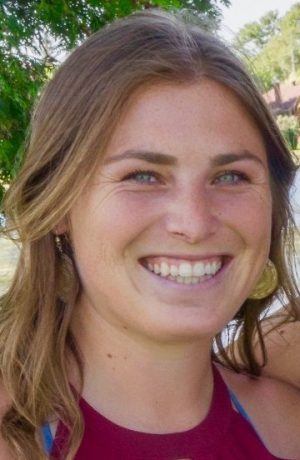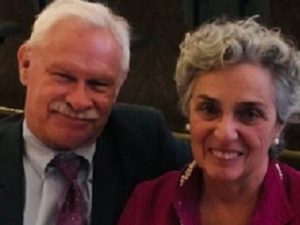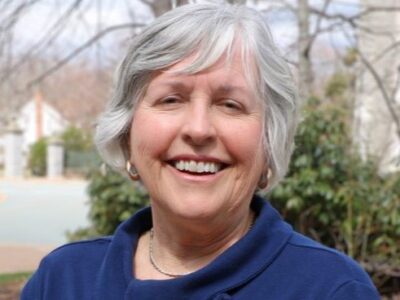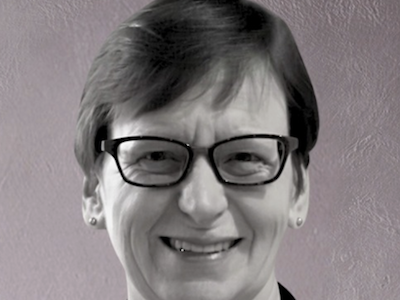 Emma Wood, an MPNL student and Community Kitchen Coordinator at Kawartha Lake Food Source, is the inaugural recipient of the Jackson Family Scholarship in Community Engagement. The scholarship is awarded to an individual who demonstrates a strong potential for leadership and innovation in community engagement on high-priority issues to nonprofits, government and businesses.
Emma Wood, an MPNL student and Community Kitchen Coordinator at Kawartha Lake Food Source, is the inaugural recipient of the Jackson Family Scholarship in Community Engagement. The scholarship is awarded to an individual who demonstrates a strong potential for leadership and innovation in community engagement on high-priority issues to nonprofits, government and businesses.
Donate to the Scholarship here
Wood is also a Research Assistant working with Professor Stephan Schott on Arctic food security and sovereignty and is founder of the Good Food Project, a community-driven, food-security nonprofit organization providing nutritious meals to people in need within the Whitchurch-Stouffville community
PANL Perspectives spoke to Wood about her experience in the nonprofit sector, the MPNL program and about her commitment to community philanthropy. The interview is by Sherlyn Assam and was edited for length and clarity. (You can donate and support the Scholarship by clicking here.)

“We’re delighted that Emma is the inaugural award recipient and the scholarship is supporting her studies. And we’re excited about the future prospects of the Good Food Project and also of Emma as a future leader in the nonprofit sector. It’s clear that she’s already playing that role.” — Ted Jackson and Magda Seydegart, founders of the Jackson Family Scholarship.
Q: What sparked your interest in community food insecurity?
Wood: I have to look to my mom and my grandma, who were always huge volunteers. We never did birthday gifts; it was sponsoring or donations or something like that. When I look back now, it was all the building blocks to where I am today.
The focus on food security was all due to a book I read during my second year at Trent University: The Stop, by Nick Saul. It changed the way I looked at food. The World Food Systems course, along with the World Agriculture course, really opened my eyes. It was the first time I ever felt passionate about school and wanted to write essays, good arguments, and to dig deeper. I got angry as I worked on my essays. I’d never had that before.
We started in the community here in Stouffville this time last year. I was unemployed, at home; my mom came back from a dog walk and told me she startled two folks sleeping in our community’s clock tower. I knew about the food bank, and I knew about a nonprofit, but I didn’t know much more, so I started asking questions, and it slowly snowballed. I look back now and think that one conversation over a cup of coffee turned into something so much bigger.
Q: What is the biggest difficulty of maintaining a supply of food?
Wood: The biggest challenge is educating people about a dignified giving approach. Countless times, I’ll get donations that have been opened and used or out of date. We get dented cans and get a lot of food that we can’t hand out legally. We don’t want to give somebody a can that’s completely smashed and say, “This is all you get.” That’s not really making anyone feel great about coming to a food bank and getting something presentable. It’s someone else’s trash.
Q: How will the Jackson Family Scholarship contribute to your work in the nonprofit sector?
 Wood: The scholarship was a huge surprise when I found out that I was chosen. Financially, it relieves some stress and allows me to say yes to things that fuel me, where I was saying no beforehand. It also solidified that what I was doing with the Good Food Project is impactful — and somebody else recognized that. I had all these thoughts in my head — “Am I doing this right? Is this the right thing to do?” – and having someone else read it and say, “This is great,” was nice to hear.
Wood: The scholarship was a huge surprise when I found out that I was chosen. Financially, it relieves some stress and allows me to say yes to things that fuel me, where I was saying no beforehand. It also solidified that what I was doing with the Good Food Project is impactful — and somebody else recognized that. I had all these thoughts in my head — “Am I doing this right? Is this the right thing to do?” – and having someone else read it and say, “This is great,” was nice to hear.
Q: How can scholarships like the Jackson family’s contribute to philanthropy?
Wood: Every student worries about how they’re going to pay for their tuition and everything else that comes with doing your studies. I know many students are working one, two or three jobs to pay for their education, or they’re going to continue paying after they’re done. Whatever can alleviate that in the moment is huge. For philanthropy, I think it really encourages innovative ideas. The Good Food Project is completely voluntary: I have to go to work, go to school, and then get to the Good Food Project afterwards. The scholarship creates connections and exposure. It’s allowing me to take what I’m learning through the MPNL program and try it out.
Read an article about Emma Wood and the Good Food Project, by Simon Martin of the Stouffville Sun-Tribune: “‘A warm meal would go a long way’: Stouffville woman brings idea to life with Good Food Project”
To the Jackson family — thank you. When I found out I received the scholarship, it was at a time where I was really doubting the Good Food Project and everything else going on with trying to balance it. It lifted my spirits to know that someone else believes in me and the work I’m doing.
Thank you to the MPNL program as well. We’re learning not only from professors, but those who have been in the sector for so long. We have classmates who are executive directors and sit on boards. Hearing their experiences is valuable, week after week, and connecting them to the course material shows where you could be in a few years or in many years — and also creates some really unique dialogue.
Click here to donate and support the Jackson Family Scholarship in Community Engagement. Photos above are courtesy of Emma Wood, Ted Jackson and the Good Food Project. Ted Jackson was an Associate Professor in the School of Public Policy and Administration at Carleton University. Magda Seydegart served as Executive Director of the Human Rights Research and Education Centre in the Faculty of Law at the University of Ottawa. Emma Wood is on LinkedIn.
Tuesday, November 23, 2021 in Alum Story, For homepage, News & Events
Share: Twitter, Facebook



